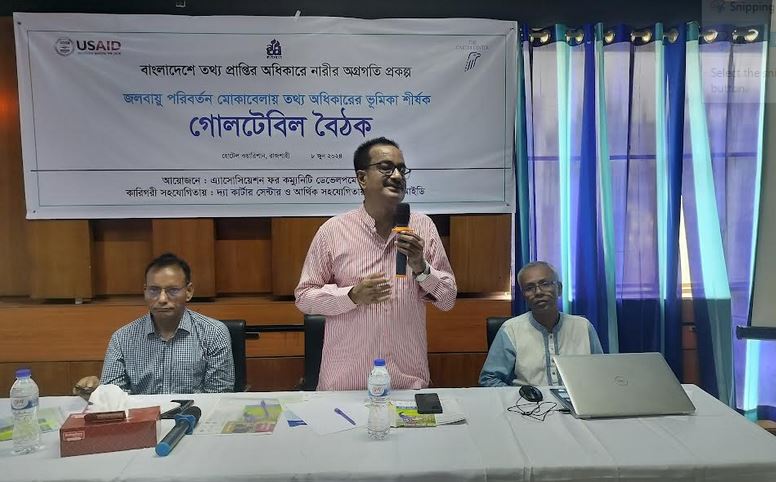
RAJSHAHI, June 8, 2024 (BSS) - Role of the Rights to Information (RTI) is very important towards protecting the region, particularly the vast barind tract, from the adverse impact of climate change.
Adverse impact of climate change is detrimental to the living and livelihood conditions of the people in general so emphasis should be given on creating mass-awareness on how to adapt the consequences of climate change collectively.
Journalists working in print and electronic media and news agencies can furnish reports on the adverse impact of climate change along with its mitigation after the best uses of the RTI law.
Experts and media personnel came up with the observation while addressing a roundtable meeting titled "Role of RTI to face climate change" at Hotel Warisan in the city today.
On behalf of its project titled "Advancing Women's Right of Access to Information in Bangladesh", Association for Community Development (ACD) organized the meeting funded by USAID and supported by the Carter Center.
Prof Chowdhury Sarwar Jahan from the Department of Geology and Mining at Rajshahi University addressed the meeting as a focal person disseminating his expertise on the issue.
Journalists Rashidul Haque, Moudud Rana, Mamunur Rashid, Sharif Sumon and Kazi Nazmul Islam also spoke moderated by Project Coordinator Subrata Kumar Paul.
Prof Sarwar Jahan viewed that adverse impacts of climate change have triggered recurrence of natural calamities in the region posing a serious threat to the farming of most of the seasonal crops and vegetables and the living conditions of farmers community in the region.
Time-befitting measures need to be adopted urgently to boost agricultural productions for ensuring food security amid adverse impacts of climatic changes.
He also mentioned that the media can supplement the process of attaining the capability of disaster management and climate change adaptation through depicting the exact extent of climate change impact.
Media can draw attention of the policy makers to the plights of the climate change victims in the region as the climate change has been pushing the living and livelihood conditions of the people into vulnerable conditions.
Prof Chowdhury Sarwar said climate change links most of the livelihood, ecosystem and biodiversity related issues. He adds that Bangladesh should be more proactive to protect its people from the adverse impact of climate change that has become a big challenge at present.
The ongoing climate change at alarming rates has severely affected every sector including agriculture, livestock and fisheries and its diversity creating a real threat to food production, the discussant opined.
He stressed for conducting more research to innovate newer technologies and ways for adaptation and expanded cultivation of stress tolerance and high yielding crops through popularising those among the farmers.
The meeting was also told that the RTI law can be the crucial means of boosting the level of confidence of the marginalized women side by side with achieving the Sustainable Development Goals (SDGs).
Living and livelihood conditions of the grassroots marginalized women can be improved immensely after the best uses of the RTI which is also helpful towards ensuring climate change adaptation, justice and social accountability.
So, all the government, non-government and other stakeholders, particularly the local government institutions, should come forward and work together to attain the cherished goal.